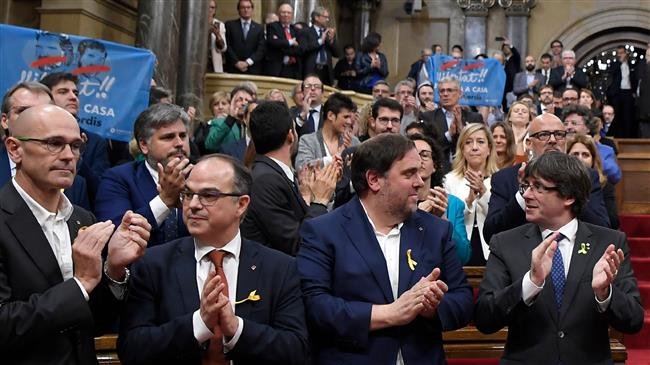Spain: Prosecutors seek up to 25 years jail for Catalan leaders
Spanish prosecutors called Friday for Catalan separatist leaders to be jailed for up to 25 years on charges of rebellion or misuse of public funds over last year’s failed secession bid.
In a statement ahead of an upcoming Supreme Court trial, the prosecution service said it was seeking prison sentences against 12 Catalan leaders ranging from seven to 25 years, the latter jail term being sought for former Catalan vice-president Oriol Junqueras.
But in a sign Spain’s socialist government disagreed, the attorney general’s office announced it would ask for just 12 years jail for Junqueras, accusing him of sedition and misuse of public funds rather than the more serious charge of rebellion.
The sensitive trial is expected to start in early 2019 — more than a year after Catalan leaders attempted to break away from Spain in October 2017 by staging a referendum despite a court ban and subsequently proclaiming independence.
Spain’s then conservative government moved swiftly to depose the Catalan executive, dissolve the regional parliament and call snap local elections in December.
Some Catalan leaders such as deposed regional president Carles Puigdemont fled abroad, while others like Junqueras remained and were put into custody pending the trial.
“They can lock us up in here for years and years, but it will not weaken the desire for freedom,” Junqueras said in a letter on Thursday.
Apart from Junqueras, prosecutors want two influential Catalan civic leaders, Jordi Sanchez and Jordi Cuixart, and former regional parliamentary speaker Carme Forcadell jailed for 17 years.
In a separate case, prosecutors said they were seeking four to 11 years jail against former regional police leaders including Catalonia’s then police chief Josep Lluis Trapero, who is also accused of rebellion.
Catalonia’s current separatist leader Quim Torra reacted angrily against the jail terms sought for “good people, peaceful people.”

“Does anyone think that the two million independence supporters will just disappear by demanding (a total of) 200 years of jail for pro-independence leaders?” he asked.
‘Intimidating force’
In its statement, the prosecution service said pro-independence leaders had planned to use all possible means to achieve secession, “including — knowing that the state wouldn’t accept this situation — any violence needed to secure this criminal result”.
It said separatist leaders had instigated “big citizen mobilizations” that represented an “intimidating force” and had also used the regional police force of 17,000 agents, who followed their orders.
The charge of rebellion has caused controversy in Spain, not just among those who support Catalan independence but further afield among legal experts.
According to Spanish law, rebellion is “rising up in a violent and public manner,” to among other things “breach, suspend or change the constitution” or “declare independence for part of the (Spanish) territory”.
Military officers behind a 1981 attempted coup in Spain were found guilty of rebellion, for instance.
But many legal experts contest the use of rebellion in the Catalan case, saying there was no violence during the secession bid, except that used by Spanish police on October 1, 2017 as they tried to stop people from voting in the banned referendum.
Spain’s justice minister acknowledged the controversy on Friday, telling reporters there was a “legal, even social debate on what happened in Catalonia in September and October last year”.
“This debate also took place at the attorney general’s office,” Dolores Delgado said, pointing out that it had decided to press charges of sedition, misuse of public funds and disobedience against Catalan leaders, and not rebellion.
She denied it was a political decision on the part of the Socialist government, which is in a minority in parliament and depends on other lawmakers, including from Catalan separatist parties, to pass bills or approve the budget.
But the right-wing opposition accused the government of bowing to separatist pressure to secure support in parliament.
In a tweet, conservative lawmaker Pablo Casado accused Prime Minister Pedro Sanchez of being “hostage to coup plotters” and “no longer legitimate to lead the government”.
(Source: AFP)
Now that you are here
The Cameroon Concord News Group Board wishes to inform its faithful readers that for more than a decade, it has been providing world-class reports of the situation in Southern Cameroons. The Board has been priding itself on its reports which have helped the world to gain a greater understanding of the crisis playing out in Southern Cameroons. It hails its reporters who have also helped the readers to have a broader perspective of the political situation in Cameroon.
The Board wishes to thank its readers who have continued to trust Southern Cameroon’s leading news platform. It is therefore using this opportunity to state that its reporters are willing to provide more quality information to the readers. However, due to the changing global financial context, the Board is urging its readers to play a significant role in the financing of the news organization. It is therefore calling on its faithful readers to make whatever financial contribution they can to ensure they get the latest developments in their native Southern Cameroons, in particular, and Cameroon in general.
Bank transaction: Soter Tarh Agbaw-Ebai
Banking IBAN: GB51 BARC 2049 1103 9130 15
Swift BIC BARC GB22XX
SORT CODE 20-49-11, ACCOUNT NUMBER – 03913015 Barclay PLC, UK
The Board looks forward to hearing from the readers.
Signed by the Group Chairman on behalf of the Board of Directors
Soter Tarh Agbaw-Ebai
Email: soteragbawebai@gmail.com





